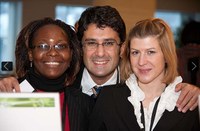 Bringing together around 325 attendees coming from 55 different countries over Europe and Africa, the “2010 Euro-Africa Week on ICT Research and e-Infrastructures” that took place in Helsinki, Finland, on Dec. 7-10, ended on a high note. Most of the interviewed participants judged the event to be a resounding success, giving a very good or excellent rating to the overall event and content. A comprehensive online survey will be soon administrated to all participants through Survey Monkey.
Bringing together around 325 attendees coming from 55 different countries over Europe and Africa, the “2010 Euro-Africa Week on ICT Research and e-Infrastructures” that took place in Helsinki, Finland, on Dec. 7-10, ended on a high note. Most of the interviewed participants judged the event to be a resounding success, giving a very good or excellent rating to the overall event and content. A comprehensive online survey will be soon administrated to all participants through Survey Monkey.
Presentations and debates were welcomed with enthusiastic participation from the delegates.
Among the mains issues that came under the spotlight were the fact that a number of collaborative EU-AU programmes to boost scientific research and development in Africa are already under way or are about to be launched, including various prize schemes and a competitive research grants programme for African scientists, as well as the AfricaConnect initiative - the first of the 19 Lighthouse projects identified through the 8th Africa-EU Strategic Partnership on Science, Information Society and Space. However, it was noted that, to collaborate with European partners, African scientists must still compete in the EU Framework Programmes and that there is still no specific framework that directly promotes joint Euro-Africa calls for research projects.
With regards to e-Infrastructures, a number of positive steps have been made over the past few years, with the number of people owning mobile phones growing rapidly and access to the internet becoming more widely available. Concomitant with these positive developments, there has been an increase in the number of services such as e-Governance, e-Health, e-Learning and e-Libraries initiatives, available. Still, however, many people, especially in rural areas and away from the coasts, lack internet access. Content in local languages and relevant to local situations is also lacking in large parts of Africa.
The overall consensus among the participants who attended the event was that the “2010 Euro-Africa Week on ICT Research and e-Infrastructures” had provided them with significant insights into the ongoing and planned EU-AU programmes for science – and specifically for ICTs – in Africa and beyond. Delegates found the opportunity to meet key players from the region and exchange experiences with international experts of great value and generally departed in an optimistic mood knowing that significant advances – both in political and infrastructural terms – have been made since the “1st Euro-Africa Cooperation Forum on ICT Research” was convened in Brussels in March 2009.
Notes
Pictures from the 3rd Eur-Africa Cooperation Forum on ICT Research are available here.
Full week report to be released in early January 2011.

